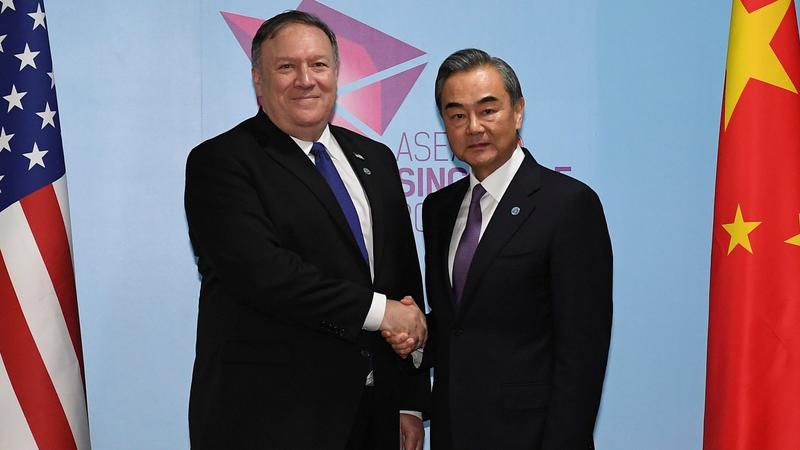
The Wall Street Journal reports that Secretary of State Mike Pompeo faced criticism from China and skepticism from Southeast Asian powers over U.S. trade policies, as well as a warning from North Korea about Washington's approach to talks, at a weekend meeting of regional leaders. At the first gathering of the Association of Southeast Asian Nations, or Asean, that he has attended since becoming America's top diplomat, Mr. Pompeo's priority was to push countries to enforce U.N. sanctions on North Korea. He called out China over allegations that it was smuggling goods into North Korea and Russia over allegations that it was promoting North Korean businesses. China didn't respond directly to Mr. Pompeo's comments, and Russia denied the allegations...Mr. Pompeo's hosts in Singapore, meanwhile, were eager to shift the weekend discussion to the widening tariff battle between the U.S. and China.Singapore's foreign minister, Vivian Balakrishnan, said the dispute "precisely illustrates why Asean needs to remain united," and the economic bloc vowed to double down on trade pacts to minimize the damage in the region, which is particularly exposed to fallout from the fight.
The Financial Times reports that President Donald Trump has claimed the US is winning the worsening trade war with China and that his tariffs on imports will help reduce the US national debt, firing back a day after Beijing threatened retaliatory tariffs on $60bn of imports from the US. "Tariffs are working big time," Mr Trump wrote on Twitter on Sunday. The day before he had said China was "doing poorly against us" and tariffs "are really hurting their economy". The president also compared the fall in China's stock market to the US's recent strong performance, arguing that trade tariffs imposed by his administration had led to steel plants reopening across the US. On Friday, the Chinese stock market lost its place as the world's second biggest after it was overtaken by Japan for the first time in almost four years. Chinese stocks have lost $2.29tn in value since their high in January, falling 27 per cent over eight months. The fall reflects investor anxiety over the trade dispute with the US, as well as worries about China's expanding debt pile and slowing economic growth. On Saturday, Mr Trump incorrectly claimed the 27 per cent fall had happened in the past four months.
- 2018-08-03 China says it will retaliate with tariffs on $60 billion in US goods
- 2018-08-02 Congress Passes Defense Bill That’s Tough on China
- 2018-08-01 China vows retaliation if Trump slaps 25% tariff on $200 billion of Chinese imports
- 2018-07-31 New US spending in Asia won't match China but it's significant in other ways
- 2018-07-30 It's in China's interest to reconsider its trade surplus with the US
- 2018-07-29 Tariffs would work — if Trump could build an economy like China's
- 2018-07-27 China Rails Against U.S. Trade Attacks With New Tariffs Looming
- 2018-07-26 Lone suspect in blast near U.S. embassy in Beijing caught
- 2018-07-25 Giving In to China, U.S. Airlines Drop Taiwan (in Name at Least)
- 2018-07-24 Defense bill offers harsh words for Russia and China
- Reuters China state media attacks Trump on trade in unusually harsh terms
- af.reuters.com GRAINS-Soybeans dip as US-China trade war escalates
- New York Times Worries Grow in Singapore Over China's Calls to Help 'Motherland'
- Financial Times China private equity funds suffer wave of closures
- Financial Times China millennials' love of credit cards raise debt fears
- Wall Street Journal Samsung Tries to Navigate Through US-China Trade Crossfire
- techcrunch.com Washington hit China hard on tech influence this week
- Reuters China diplomat says hopes ties with Australia return to health soon
- Reuters China's EximBank's Belt and Road loans up 37 pct in H1 - Xinhua
